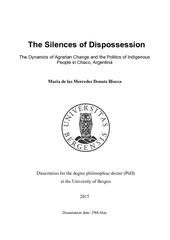The Silences of Dispossession. The Dynamics of Agrarian Change and the Politics of Indigenous People in Chaco, Argentina
Doctoral thesis

Åpne
Permanent lenke
https://hdl.handle.net/1956/17608Utgivelsesdato
2015-05-29Metadata
Vis full innførselSamlinger
- Department of Sociology [424]
Sammendrag
Recent studies of ‘accumulation by dispossession’ have highlighted the link between agrarian changes and the expansion of social capitalist relationships that has occurred in the neoliberal era. However, the high degree of abstraction of these studies and the lack of analysis of the role of the actors involved in these processes, especially the subaltern groups, presents challenges for the analysis of empirical processes (Hart, 2002; 2004; Hall, 2013). To overcome these limitations this work proposes to analyze processes of agrarian change through an approach centred on the ‘local rationalities’ of the actors involved (Nilsen and Cox, 2013). From that perspective this thesis argues that the positions of the actors in ‘processes of accumulation by dispossession’ can be explained by examining their memories of past experiences, the actual forms of power and dispossession and the position of subalternity of each group in a determined time and place (Li, 2000; Hodgson, 2011). The focus on local rationalities is applied here to analyze the different perceptions and positions of two indigenous communities in the province of Chaco, Argentina with regard to the expansion of the agribusiness model since the 1990s. This work thus seeks to illuminate the multiple dynamics that exist between subaltern and dominant groups in the different contexts of dispossession. Through analyzing these processes by considering the complex network of power relationships that have been produced, which generate acts of resistance but also complicity, this approach aims to make a contribution that will help to revitalize political readings of new rural dynamics linked to capitalist development.